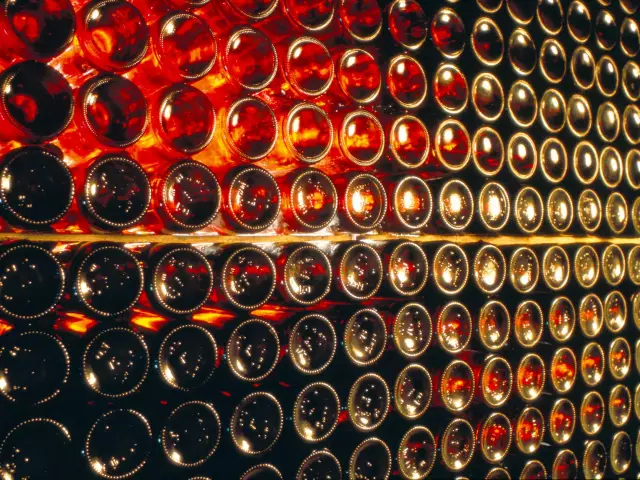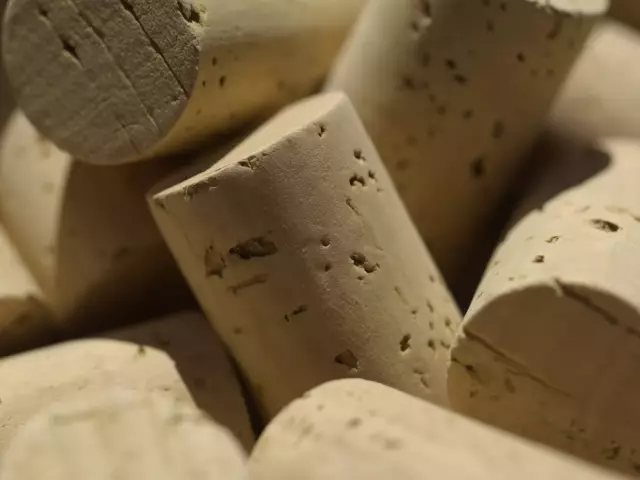Noble Sweet Wines

When the main grape harvest in the German wine-growing regions has ended successfully, one can observe that in certain locations individual vineyards have not yet been harvested.
Delicious, precious noble sweet wines
When the main grape harvest in the German wine-growing regions has ended successfully, one can observe that in certain locations individual vineyards have not yet been harvested. They have not been forgotten by the winemaker, rather they are waiting to become noble sweet delicacies. In favorable autumn weather, the grapes continue to develop and naturally increase their sweetness every day.
"A Gift from Nature"
Basically, one can differentiate between two methods of producing such noble sweet rarities. On the one hand there are the Beerenauslese or Trockenbeerenauslese, for which a fungus is particularly helpful, the so-called ‘noble rot’, or if you want to impress someone, cite the technical term Botrytis Cinerea. When the grapes are very ripe in autumn and it is also damp and relatively warm, this fungus attacks the grapes, making the berry skin porous and drying them up like a raisin. The water in the grape evaporates and what is left is an extremely sweet juice, from which very sweet wines are created.
During the harvest, these dried grapes are specially selected, which explains the name "Auslese" meaning choice or selection. Incidentally, the yeasts in the wine do not manage to ferment all of the natural sugar and therefore such wines generally have very little alcohol. You can also see the high sugar content, because if you swirl such wines in a glass: The consistency is thicker, almost oily. Dried berries are mostly golden yellow in color, which is caused by the noble rot, while ice wines tend to keep a light color.
More Knowledge: Quality Categories
Ideally suited for cellaring
Depending on how sweet the grapes were when harvesting, there are the gradings Auslese, Beerenauslese or Trockenbeerenauslese. Trockenbeerenauslesen are very rare, maybe even rarer than ice wines, and therefore very expensive. The most expensive Trockenbeerenauslese wines in recent years were auctioned for well over €1000 per bottle.
Due to the high sugar content, such wines can be aged for decades if properly cellared. Long aging requires a high proportion of extract substances, fruit acid, ripe sweetness and alcohol in the wine. With their finesse and harmony, older noble sweet wines offer a perfection that is hard to beat. They are ideal for special moments and the great events in life. They should be stored properly in a cool place and usually reach their prime after 5-10 years however they can keep improving and after 20 or 30 years can become sublime.
Noble sweet wines are great companions for festive occasions and an excellent aperitif that will delight gourmets. When the dinner is completed, noble sweet rarities promise a glamorous finale. They are a beautiful accompaniment to sweet dishes, especially fruity desserts, ice cream or sorbets. In the lead-up to Christmas, such sweet wines are particularly suitable for fruit cakes, which also contain raisins, for spiced cookies and gingerbread and of course as a high-quality gift.
How expensive are "Trockenbeerenauslesen"?
Trockenbeerenauslesen are very rare, perhaps even rarer than ice wines, and therefore very expensive. The most expensive Trockenbeerenauslesen of recent years was auctioned for well over 1000€ per bottle.
Varietals

More recipe ideas
Light and fluffy: cashew coconut mousse with passion fruit Cashew coconut mousse with passion fruit
An airy cashew coconut mousse with passion fruit
- 400g Cashewkerne
- 400ml Haferdrink
- 6EL Agavendicksaft
- 6EL Kokosflocken
- 4 Passionsfrüchte
- 1 Prise Vanille
Place the cashews in a container and add enough water to cover the cashews sufficiently. Place the cashews in the fridge to soak overnight.
(With a high-performance blender, 3-4 hours is also sufficient.)
Drain the water and place the cashews in the blender with the oat milk, agave syrup and coconut flakes. Add the vanilla and blend until the mousse is creamy and no longer contains any chunks.
<p
<p>Divide the mousse between four glasses. Halve the passion fruit, scrape out the flesh with a teaspoon and place on top of the mousse. Decorate with coconut flakes.
- Pinot Blanc (süß & edelsüß)
- Riesling (süß & edelsüß)
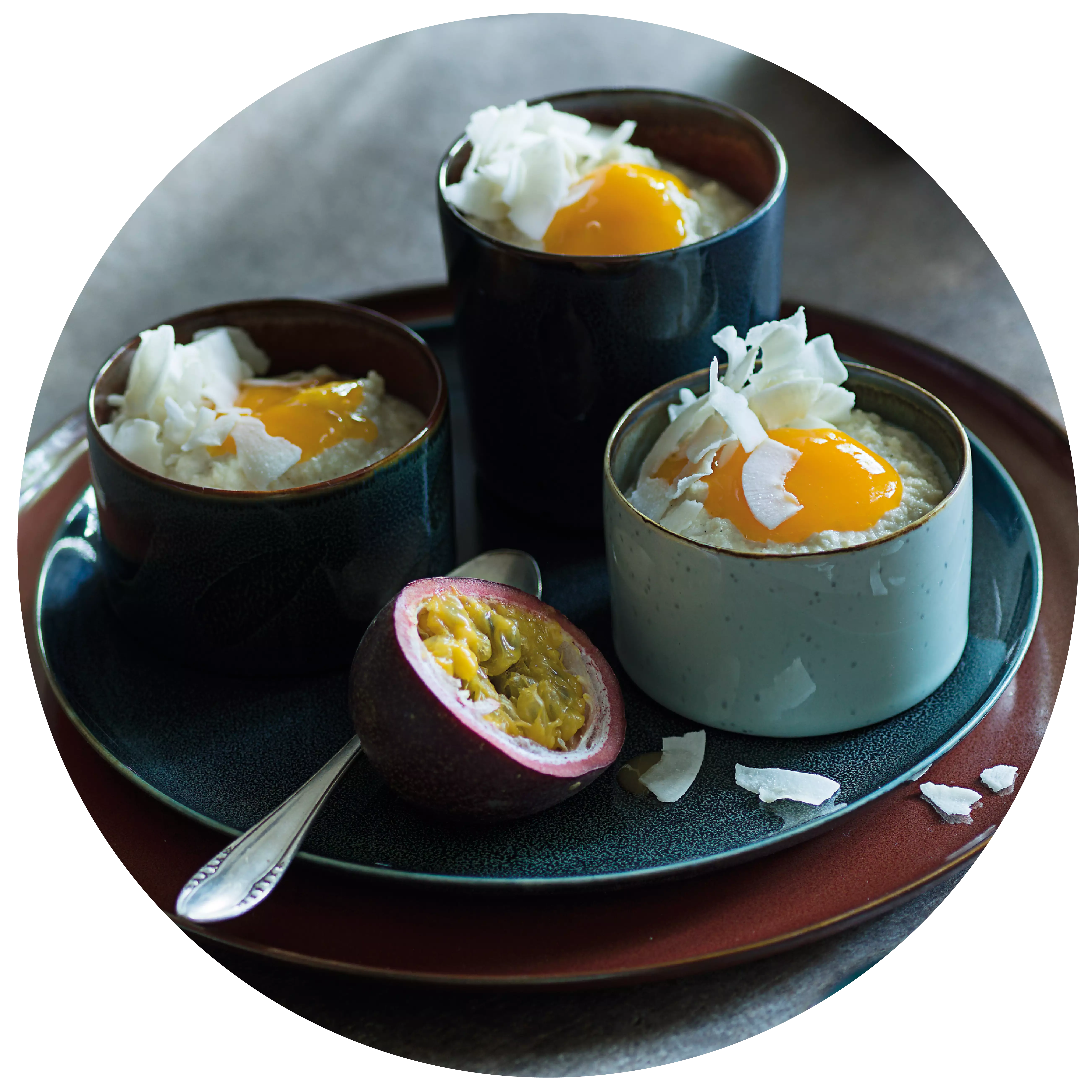
with fresh chanterelles Autumn bruschetta
with fresh chanterelles
- 4 Ciabatta-Brötchen
- 200 Gramm kleine Pfifferlinge
- 4 EL kleingehackte Petersilie
- 4 Zehen Knoblauch
- 80 Gramm Pecorino (Hartkäse)
- 8 EL kaltgepresstes Olivenöl
- Eine Prise Salz & Pfeffer
Preheat the oven to 200 degrees.
Clean the chanterelles. Sauté the parsley in a pan with half of the oil, then add the mushrooms and cook over a low heat for approx. 5 minutes.
Slice the rolls and bake for approx. 5 minutes until crispy.
Chop the garlic into small pieces, spread on the warm bread rolls and drizzle with the other half of the oil. Coarsely grate the pecorino.
Stir the chanterelle and parsley mixture into the pecorino and spread over the halves of the rolls.
- Pinot Gris (trocken)
- Federweißer (brut nature)
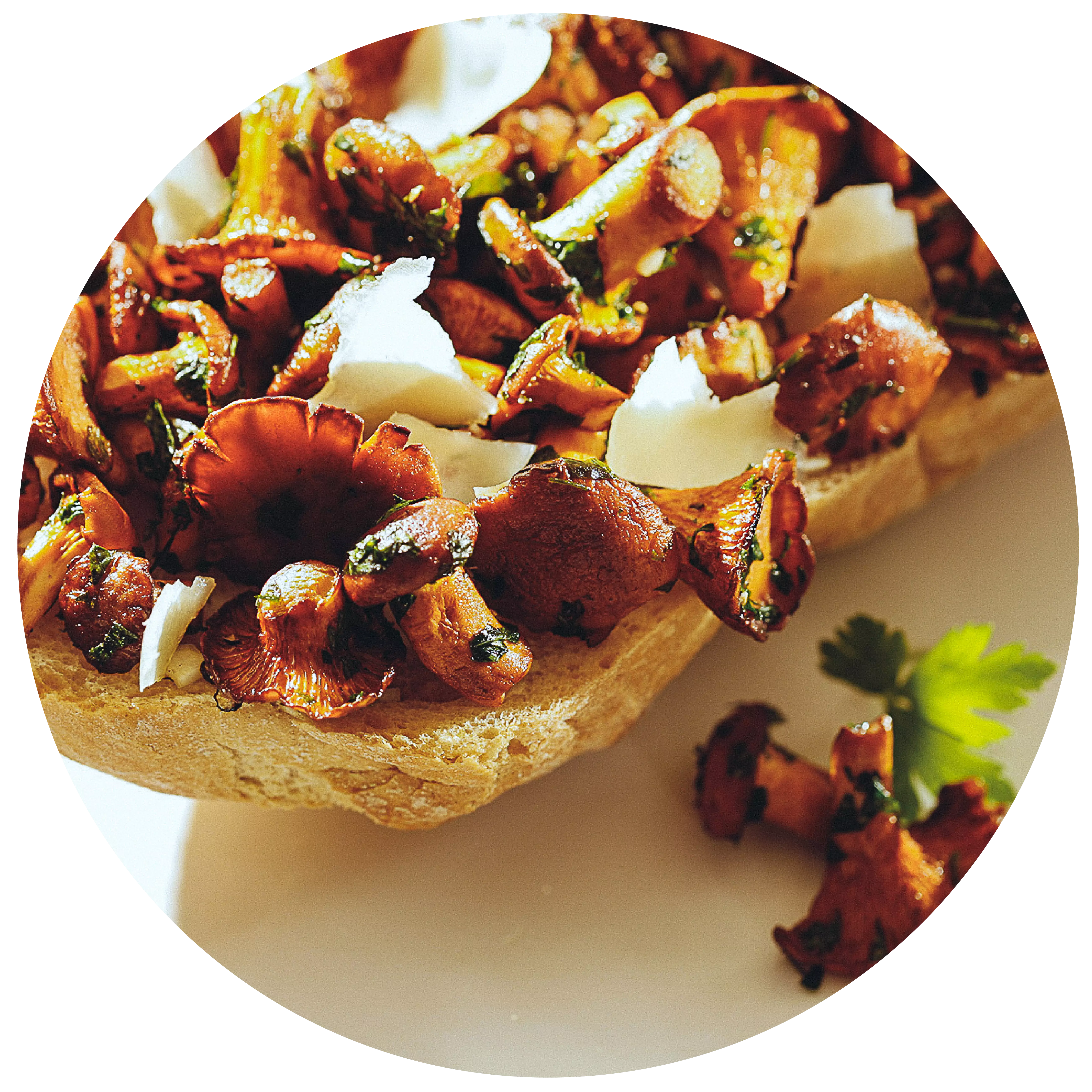
with semi-dry wines Flädlesuppe
with semi-dry wines
- 1 Bund Schnittlauch
- 1 Liter Fleischbrühe
- 150 Gramm Weizenmehl
- 300 ml Milch
- nach Belieben Speckschwarte zum ausreiben der Pflanne
- Etwas Salz
Make a smooth, not too thick batter from the flour, milk, eggs and a pinch of salt. Heat a heavy frying pan on a high heat, rub with bacon fat, pour in a small dollop of batter, allow to spread and fry thin pancakes (flädle).
<p
<p>Leave the pancakes to cool, halve and cut into thin strips.
Place in clear, very hot meat stock and serve immediately.
<p- Trollinger (halbtrocken & feinherb)
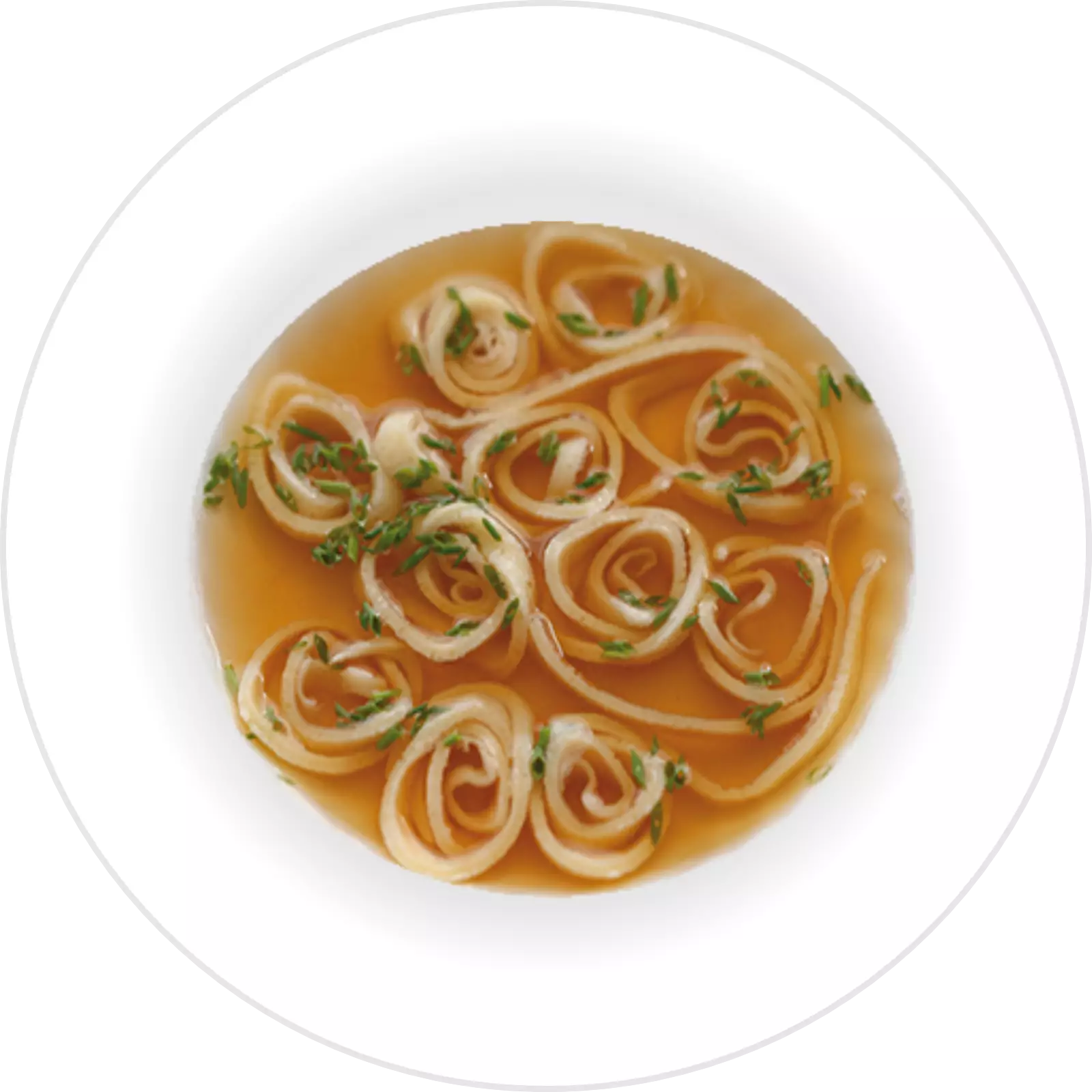
in a bacon coating Lamb
in a bacon coating
- 4 Stück Lammlachse à 150 g
- 4 Scheiben Bacon
- 0,1 Liter Wein
- 0,3 Liter Gemüsebrühe
- 1 kleine Schalotte
- 20 Gramm Butter
- 4 EL Olivenöl
- je 2 Zweige Thymian, Rosmarin, Salbei
- nach Geschmack Salz & Pfeffer
Season the lamb salmon with pepper and massage 2 tbsp of olive oil into the meat. Finely chop the thyme, rosemary and sage and season the meat in the herbs. Marinate in the fridge for a few hours.
<p
<p>Wrap the meat with the bacon slices and sear on all sides in the remaining olive oil. Continue to cook for approx. 4 minutes on each side over a low heat (the cooking time depends on the thickness of the lamb loin - it is best to do a pressure test). Then wrap in aluminium foil and leave to rest in the oven at 80 °C – so they remain juicy and slightly pink on the inside.
This goes well with Bärlauch risotto.
- Dornfelder (trocken)
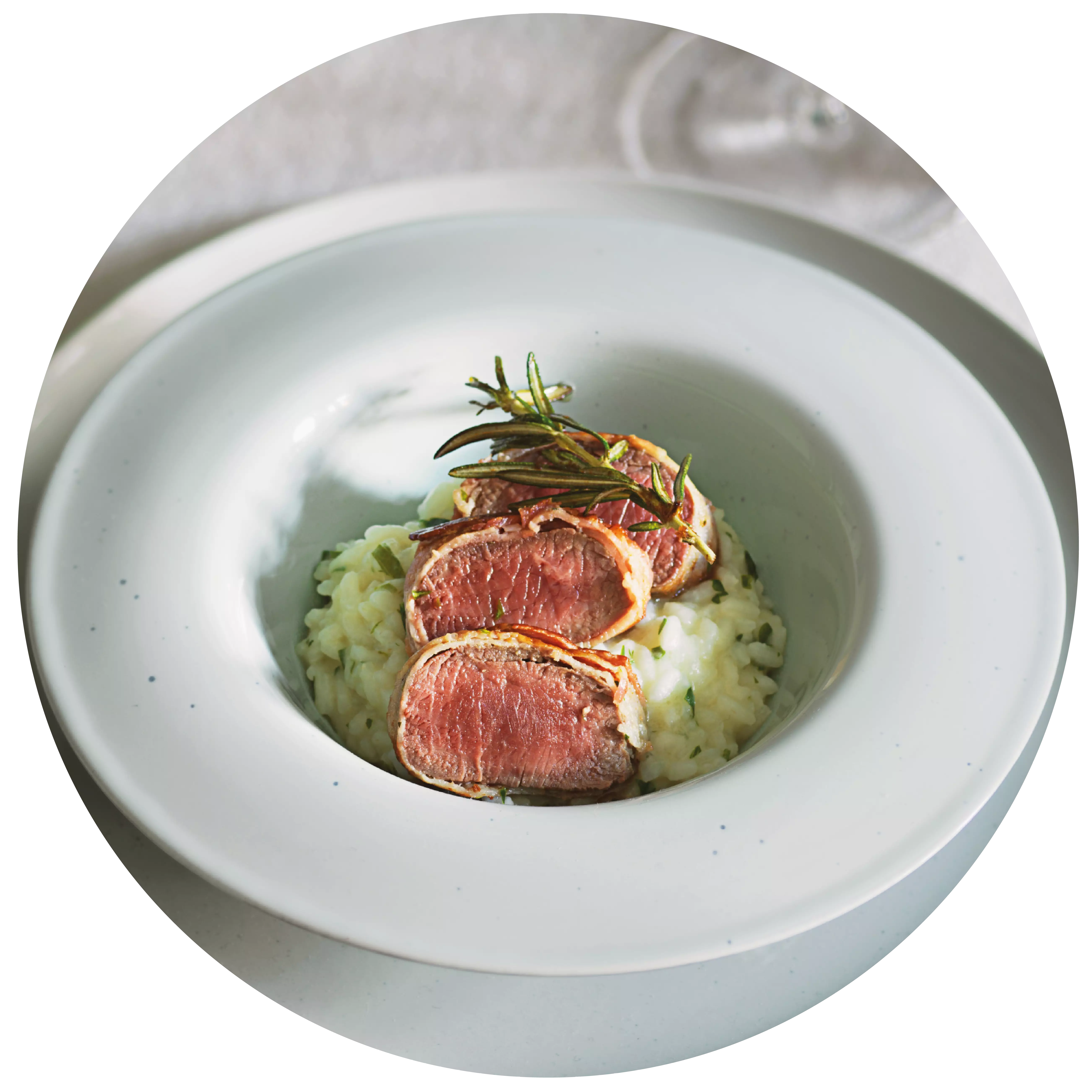
Events
-
Show
winetasting in our winery - cheese & wine
Mainz-Hechtsheim


